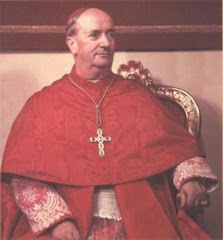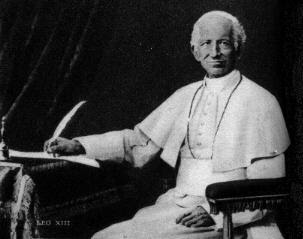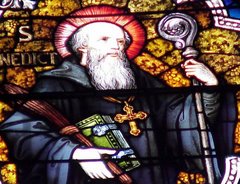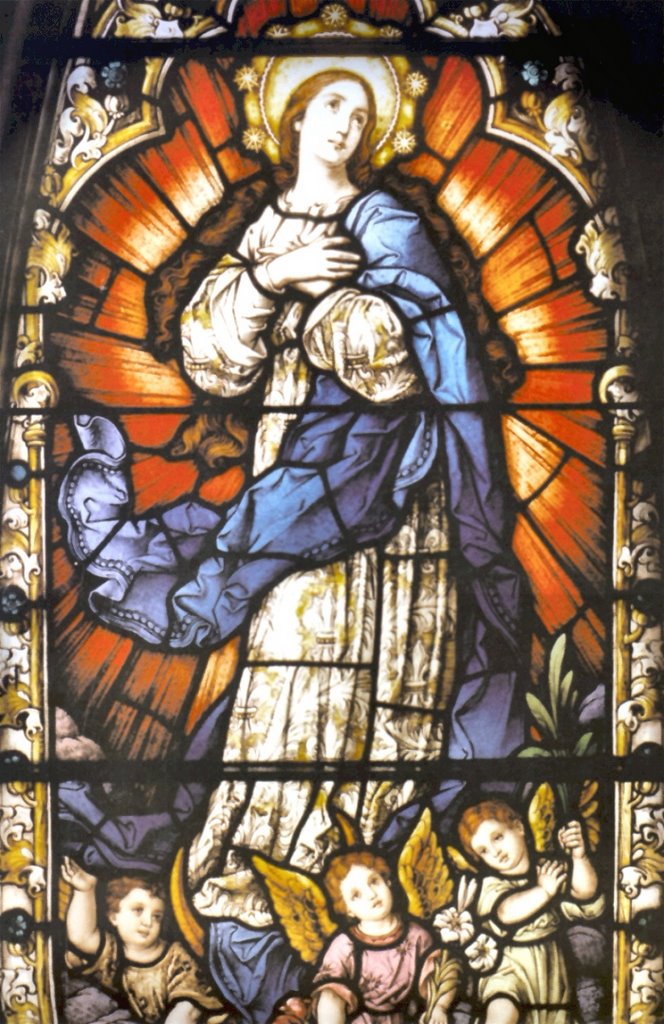Very recently the Vatican came out with a document that questioned the doctrine of Limbo.
Many believe that Limbo is nothing more than a theological speculation. They believe that Limbo has never been declared dogma, and thus is not to be believed as such, and we are free to question it's possibile truthfulness and existence. Many clerics and theological works of the last century have stated that the Limbo of the Children is nothing more than this sort of theological speculation, and thus it has passed into the minds and hearts of the laity. We know that unbaptized infants are conceived in a state of original sin. So how does all of this downplaying of this dogma of the faith square with this dogmatic fact? Below I will attempt to illustrate, not only that Limbo exists, but that it is de fide, to be believed as Catholic truth, from the Fathers, theologians, the popes, and the Councils of the Church. The Catholic Church teaches that no one can be freed from original sin without baptism, and that infants are excluded from the beatific vision if they die so unbaptized, that is, with original sin still on their souls. This is because no one can see the kingdom of God without the Sacrament of Baptism (Jn. 3:5), and this includes infants, indeed it includes the whole human race. The Catholic Church's teaching is that children and infants who die without baptism descend immediately into Hell, but that they do not suffer the fires of Hell. They go to a place in Hell called the limbo of the infants. The most specific definition of the Church that there is no way for an infant to be saved without the Sacrament of Baptism follows from one, Pope Eugene IV:
“Regarding children, indeed, because of danger of death, which can often take place, when no help can be brought to them by another remedy than through the sacrament of baptism, through which they are snatched from the domination of the Devil and adopted among the sons of God, it advises that holy baptism ought not be deferred for forty or eighty days, or any time according to the observance of certain people…” (Council of Florence, Session 11, Feb. 4, 1442)
This teaches that there is no other remedy other than baptism in the justification of a soul in original sin. It teaches that those in original sin are under the domination of the devil, and that the only way to become a Son of God and an heir of heaven is to have that sin washed away in Baptism, and thus, it should not be delayed because of local customs. Florence basically continued, in this manner, in the Tradition recieved from the Council of Carthage:
“It has been decided likewise that if anyone says that for this reason the Lord said: ‘In my Father’s house there are many mansions’ that it might be understood that in the kingdom of heaven there will be some middle place or some place anywhere where the blessed infants live who departed from this life without baptism, without which they cannot enter into the kingdom of heaven, which is life eternal, let him be anathema.” (Pope St. Zosimus, The Council of Carthage, Canon on Sin and Grace, 417 A.D.)
It anathematizes anyone who would say that there is a place where infants, who are not initiated, go to some place besides Hell, because since they do not have Baptism, they cannot enter into the Kingdom of Heaven and thus have eternal life, and they do not go to purgatory because that is a place of purgation for those who have sinned actually, been forgiven, and are saved from Hell, and that there is no middle place outside of Heaven or Hell where these infants can go, thus, it logically follows that these infants go to Hell, since there is no alternative. Does this mean that the issue is up for debate? Can we question these dogmatic pronouncements? Limbo is not a Middle place, despite the misconceptions of some misinformed Catholics, but a punishment of the separation of God which is a "different" punishment from those who have sinned and are damned to Hell fire. A Tradition also echoed by the Council of Trent:
“If anyone says that recently born babies should not be baptized even if they have been born to baptized parents; or says that they are indeed baptized for the remission of sins, but incur no trace of the original sin of Adam needing to be cleansed by the laver of rebirth for them to obtain eternal life, with the necessary consequence that in their case there is being understood a form of baptism for the remission of sins which is not true, but false: let him be anathema.” (Pope Paul III, The Council of Trent, On Original Sin, Session V)
Trent declares that if anyone says that infants recieve the sacrament of Baptism for the remission of sins, but that infants don't incur original sin which needs to be so cleansed, that they are anathema - it is heresey for anyone to say that infants don’t need the “laver of rebirth” (sacramental baptism) to attain eternal life. The Council of Florence goes on to say:
“We define also that… the souls of those who depart this life in actual mortal sin, or in original sin alone, go straightaway to hell, but to undergo punishments of different kinds.” (Pope Eugene IV, Council of Florence, “Letentur coeli,” Sess. 6, July 6, 1439)
“The doctrine which rejects as a Pelagian fable, that place of the lower regions (which the faithful generally designate by the name of the limbo of the children) in which the souls of those departing with the sole guilt of original sin are punished with the punishment of the condemned, exclusive of the punishment of fire, just as if, by this very fact, that these who remove the punishment of fire introduced that middle place and state free of guilt and of punishment between the kingdom of God and eternal damnation, such as that about which the Pelagians idly talk” – Condemned as false, rash, injurious to Catholic schools. (Pope Pius VI, Auctorem fidei, Aug. 28, 1794)
The Council of Trent defined that infants do contract original sin which needs to cleansed, by baptism, without which cleansing they cannot enter heaven. The Council of Florence declared that those who depart this life in origina sin alone, such as would the infant who is not baptized would have, would descend into Hell, but to be punished differently from those with actual sin. Catholic Tradition teaches that they go to a place in Hell where there is no fire, they experience eternal separation from God. Auctorem fidei says the belief that condemns Limbo as some middle place between the punishment of God and eternal damnation, is condemned.
Pope Pius XI, Mit brennender Sorge (# 25), March 14, 1937: “‘Original sin’ is the hereditary but impersonal fault of Adam’s descendants, who have sinned in him. It is the loss of grace, and therefore eternal life, together with a propensity to evil, which everybody must, with the assistance of grace, penance, resistance and moral effort, repress and conquer.”
Pius IX teaches that Original sin is inherited by all men, and infants, and that by this Original Sin all men are by nature devoid of eternal life, so that infants with original sin do not have, and cannot have, eternal life.
St. Augustine, A.D. 415: “Anyone who would say that infants who pass from this life without participation in the Sacrament (Baptism) shall be made alive in Christ truly goes counter to the preaching of the Apostle and condemns the whole Church, where there is great haste in baptizing infants because it is believed without doubt that there is no other way at all in which they can be made alive in Christ.”
St. Augustine says that those who say that infants who die without Baptism will be saved not only act contrary to the Apostolic Tradition, but condemns the whole Church. He says that there is no other way for an infant to be "made alive in Christ" other than Baptism. Pope St. Innocent expressed the teaching of tradition on this matter, against the Pelagian heretics:
Pope St. Innocent, 414 A.D.: “But that which Your Fraternity asserts the Pelagians preach, that even without the grace of Baptism infants are able to be endowed with the rewards of eternal life, is quite idiotic… But those who defend this for them without rebirth seem to me to want to quash Baptism itself, when they preach that infants already have what is believed to be conferred on them only through Baptism.”
It must be remembered that it was Jesus Christ who laid down the requirement that all men, including infants, must be baptized for salvation: “Unless a man is born again of water and the Holy Ghost he cannot enter into the Kingdom of God” (John 3:5), and the Councils express this doctrine most vividly. The Church thus teaches that unbaptized infants cannot go to heaven, and that there is no middle place for them, and that all in original sin go to Hell, but to be punished with different punishments, this is the teaching of the Church from which no one can deviate and keep his Catholic name, for this is what has been declared infallibly by the vicar of Christ on earth as the infallible truth. The above is basically Limbo by definition, which is the belief that unbaptized infants do not go to heaven, and do not go to a middle place, but that they go to Hell, and are punished differently from those with actual mortal sin by suffering the separation from God soley as a result of their original sin; aside from the definition of the non suffering of the fires of Hell but simply the separation from God and the beatific vision this is defined dogma.
So whether the Vatican likes it or not, Baptism is a requirement for salvation to all. And it is significant to note that Catholic doctrine is unchangeable, and that there is more of a likely hood that the sun could orbit Pluto than that Catholic doctrine be altered, as eternal truths from God do not change, no matter how many declarations are issued from the Vatican.
It must also be noted that the Vatican has also stated that Hell, Heaven, and Purgatory are not real places, and now that Limbo is not the fate of unbaptized infants. And this is coming from people who say that false religions are wonderful and enlightening and that Jesus might possibly not be Messiah prophesiesed in the Old Testatment. They have said that the Primacy of St. Peter is not dogmatic but simply a tradition and that the Jews' interpretation of scripture is valid etc. They are trying to eradicate Catholic dogma and replace it with the false notions produced by the Vatican assembly and the works of anti-papa. The post Vatican II religion is bit by bit attempting to overturn all of the traditions given by Christ and the apostles and dogmatically taught by the Catholic Church. They are deceiving Catholics into blindly following the errors of their new religion divorced from the Catholic religion, which is the bride of Christ.

















